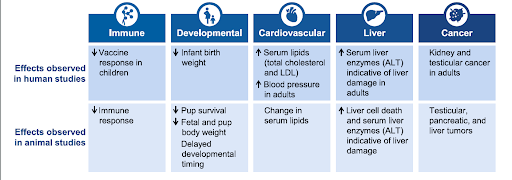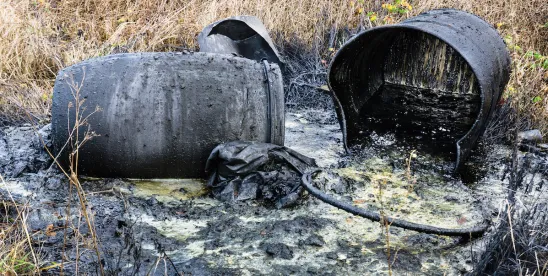Monday, August 4, the State of New Jersey announced a landmark settlement with DuPont and related companies (“DuPont Defendants”) valued at more than $2 billion, the largest environmental recovery for a single State – and one of the top-20 largest settlements of any kind – in U.S. history.
The landmark agreement settles the State’s case against DuPont regarding PFAS (per- and polyfluoroalkyl substances), also known as “forever chemicals,” contamination across the State and addresses PFAS and other contamination at and from four historical DuPont industrial sites: Chambers Works, Parlin, Pompton Lakes Works, and Repauno. DuPont’s decades-long use and discharge of PFAS has polluted drinking water and natural resources throughout New Jersey.
PFAS are known for their resistance to degradation, meaning they persist in the environment. Several PFAS, like PFOA, have been linked to health effects including kidney and testicular cancer, and reproduction issues. In 2005, the US EPA found that DuPont concealed the toxicological effects of PFOA, including that the chemical passes through the human placenta. New Jersey was the first State to pass a PFAS drinking water standard in 2018. The federal government passed a regulation establishing Maximum Contaminant Levels (“MCLs”) for certain PFAS, including PFOA, in 2024. In 2025, USEPA confirmed that PFOA is likely to be carcinogenic to humans following “the EPA’s systematic review of over 780 human and animal health studies demonstrated PFOA exposure elicits adverse noncancer and cancer health effects.”

The State originally filed suit against E.I. du Pont de Nemours and Co. (now known as EIDP, Inc.), The Chemours Company, Corteva, Inc., and DuPont de Nemours, Inc., and the 3M Company in 2019 due to contamination from the Chambers Works site currently owned by a Chemours, a DuPont spin-off. After years of extensive discovery and mediation guided by Special Master Judge Joel Schneider, the parties were set for trial on May 19, 2025. This marked the first State case in the country to go to trial for PFAS contamination, remediation, and natural resource damages.
Five days before trial was to commence, the State reached a settlement with one of the Defendants – the 3M Company (“3M”) – for $450 million. 3M manufactured PFAS and sold them to other companies, including DuPont, which utilized the chemicals in its manufacturing operations at issue in this case. The funds from the 3M settlement will compensate the citizens of New Jersey for injuries to their natural resources, fund projects to address PFAS contamination of drinking water supplies and other environmental media, and reimburse NJDEP and other arms of the State for costs incurred to investigate and prosecute claims based on PFAS contamination.
The trial against the DuPont Defendants began in Camden, New Jersey on May 19, before Chief Judge Renée Marie Bumb, U.S. District Judge for the District of New Jersey. For four weeks, the State tried five combined bench trials on statutory liability claims against the DuPont entities related to PFAS, including PFOA, and other contamination discharged from DuPont’s Chambers Works site on the banks of the Delaware River. The State litigated its causes of action including alleged violations of the New Jersey Spill Compensation and Control Act (“Spill Act”) and the Water Pollution Control Act arising from DuPont and Chemours’ unauthorized discharge of PFAS and other contaminants into the waters of the State.
The DuPont Defendants asserted numerous defenses to each aspect of the State’s claims, including that the State was barred from pursuing the claims under the doctrines of laches and estoppel, that prior remedial decisions prevented the remediation at and from Chambers Works, that PFAS was not covered under the State’s environmental laws, that DuPont was released for natural resource damages liability through prior administrative actions, that DuPont was exempted from liability under the government contractor defense, that the State’s claims violated DuPont’s due process rights, and numerous other defensive theories and arguments. These issues were all tried this summer as part of the State’s case to establish the liability of DuPont and Chemours under the Spill Act, Brownfield Act, and Water Pollution Control Act.
During trial, the DuPont Defendants stipulated to drop a majority of their pleaded defenses, and to a geographical “nexus” defining the scope of liability under the Spill Act. On May 30, the Court ruled in favor of the State with regard to the administrative defense, finding that the Consent Order did not release DuPont from PFAS liability and contained conditions precedent that were not satisfied by the company. The Court had not ruled on the other claims or defenses at the time of the settlement.
The trial continued with extensive fact and expert witness testimony until June 9, when the Court recessed. Trial was set to resume on June 30 with a sixth bench trial on the State’s fraudulent transfer claims related to DuPont’s 2015 restructuring. The Court also planned to conduct a jury trial in the Fall of 2025 on the State’s common law claims, including negligence and public nuisance, and all damages. However, during the recess, the parties reached this landmark settlement.
Lead counsel for the State of New Jersey was Kelley Drye & Warren LLP, which tried the case alongside New Jersey Deputy Attorney General Gwen Farley and the Law Offices of Jack Dema.
The settlement is valued at more than $2 billion. Foundational to the settlement is the agreement that DuPont is responsible to remediate the Chambers Works, Parlin, Pompton Lakes, and Repauno industrial sites, to address PFAS released from the Chambers Works and Parlin Sites, and to pay all costs and damages called for under the settlement. DuPont operated some of these sites for more than a century, causing massive PFAS and other contamination, and significant injuries to New Jersey’s waters and other natural resources. The remainder of the settling defendants are agreeing to stand behind the remediation and funding obligations of DuPont, ensuring that the polluter pays and not New Jersey taxpayers.
In addition to the DuPont Defendants’ absolute obligations to remediate the contamination at and from these four industrial sites, they have agreed to establish financial assurance mechanisms at the four sites, which may total more than $1.2 billion by the terms of the agreement. In addition,, Corteva and New DuPont have agreed to create another $475 million “Reserve Fund” to be held in trust by a third-party. The fund will back up the primary financial assurance mechanisms and add another layer of protection for the State to ensure these obligations do not fall to the taxpayers of New Jersey.
Additionally, the DuPont Defendants have agreed to pay the State $875 million for PFAS abatement costs and natural resource damages across the State, and to reimburse and pay the State’s costs in addressing PFAS and litigating these claims.




 />i
/>i
